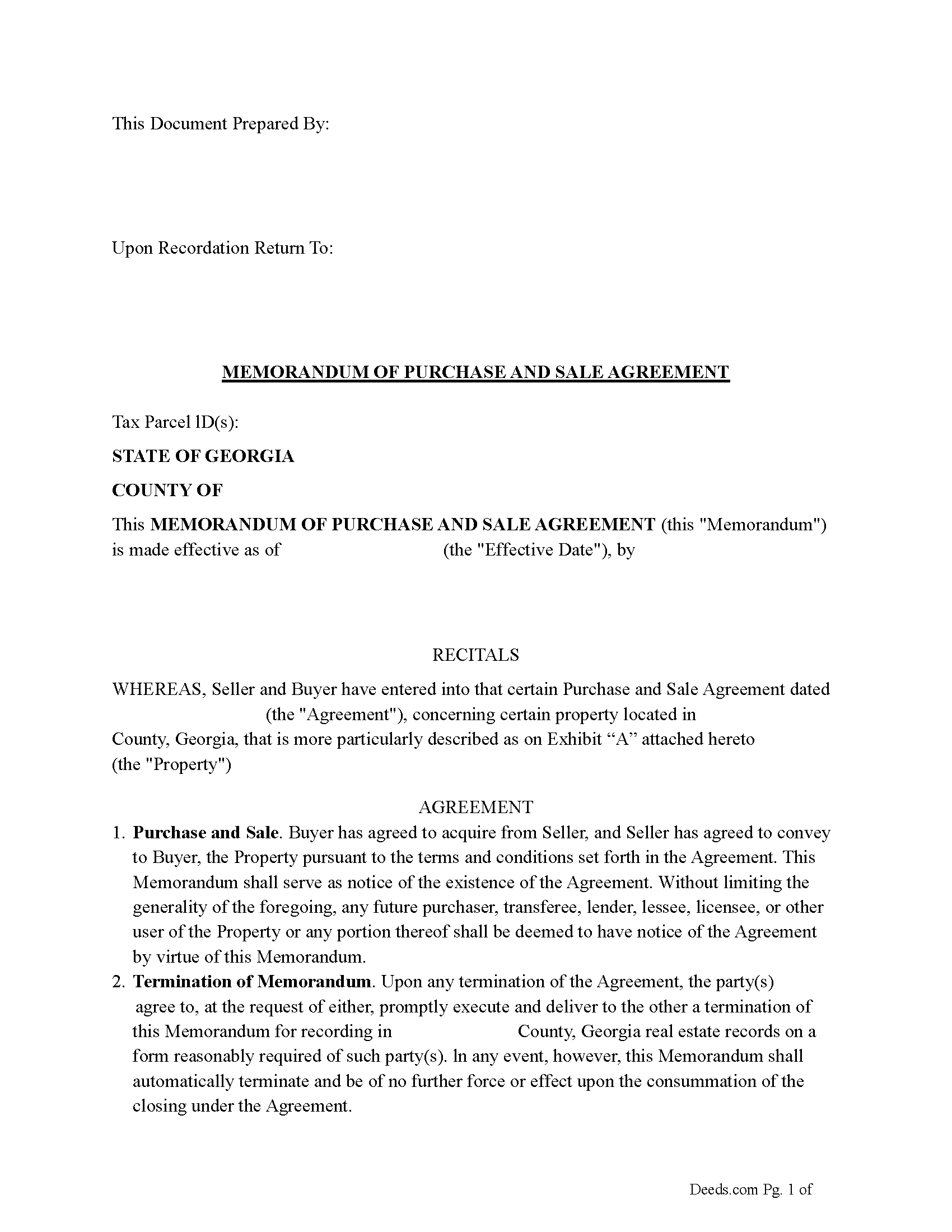Download Georgia Memorandum of Purchase and Sale Agreement Legal Forms

Georgia Memorandum of Purchase and Sale Agreement Overview

In Georgia, recording a Memorandum of Purchase Agreement instead of the full Purchase Agreement is a common practice for several important reasons:
1. Privacy Protection
• Limited Disclosure: A Purchase Agreement contains many detailed terms that the parties may prefer to keep private, such as the purchase price, payment terms, or specific contingencies. By recording a Memorandum of Purchase Agreement, only essential details (e.g., parties involved, property description, and the existence of the agreement) are made public, keeping the sensitive terms confidential.
• Public Record Privacy: Recording the full Purchase Agreement would make all of its terms accessible to the public, which may not be desirable for either party, especially for large or high-profile transactions.
2. Notice to Third Parties (Constructive Notice)
• Protecting Buyer’s Interest: Recording a Memorandum serves as constructive notice to third parties that there is a pending contract on the property. This prevents the seller from selling the property to another buyer during the term of the Purchase Agreement. Once the Memorandum is recorded, any future potential buyers or lenders are put on notice of the existing purchase contract, protecting the buyer’s interest.
• Clouding Title: The recorded Memorandum clouds the title of the property, making it difficult for the seller to transfer or encumber the property without addressing the existing Purchase Agreement. It ensures that the buyer has an equitable claim on the property that must be resolved before any other transfer or claim.
3. Simplicity and Cost-Effectiveness
• Shorter Document: A Memorandum of Purchase Agreement is typically a much shorter document than the full agreement. This makes it easier and faster to record. Many counties charge recording fees based on the number of pages, so recording the shorter Memorandum can reduce costs compared to recording the entire Purchase Agreement.
• Avoiding Excess Paperwork: Georgia’s recording system allows for the recording of summary documents like Memoranda to provide notice without the administrative burden of recording lengthy contracts.
4. Flexibility in Negotiations
• Contingent Agreements: Sometimes, Purchase Agreements are contingent on certain conditions, such as financing or inspections. Recording the full Purchase Agreement might disclose these contingencies, which could undermine negotiations. A Memorandum, however, only discloses the fact that a contract exists without divulging details that could affect ongoing negotiations or contingencies.
5. Key Considerations:
• Recording in Public Records: The memorandum is typically recorded to prevent other parties from attempting to acquire an interest in the property without knowledge of the pending transaction. Georgia law allows for various real estate-related documents to be recorded with the county clerk of the superior court where the property is located.
6. Legal Sufficiency
• Binding Notice: Under Georgia law, recording a Memorandum of Purchase Agreement has the same effect as recording the full agreement in terms of providing legal notice. It is sufficient to establish that there is an agreement affecting the property, so there is no legal requirement to record the entire Purchase Agreement as long as the Memorandum fulfills the notice purpose.
• Recording a Memorandum of Purchase Agreement in Georgia offers privacy, efficiency, and legal protection without exposing the full details of the transaction. It serves the main purpose of notifying the public of the buyer’s interest in the property while keeping confidential terms private and saving on costs and effort. This is the preferred practice in real estate transactions where recording the entire Purchase Agreement would be unnecessary and potentially disadvantageous.
Relevant Statutes:
1. O.C.G.A. § 44-2-1 et seq. (Georgia Recording Statutes): These statutes govern the recording of deeds, leases, and other instruments affecting real property in Georgia. Under these statutes, certain documents, including those related to the conveyance or encumbrance of property, can be recorded to provide public notice.
2. O.C.G.A. § 44-14-61 (Filing of Liens): This statute refers to the recording of certain documents in relation to property interests. While primarily about liens, it underscores the general principle that documents affecting property rights (including purchase agreements or their memoranda) may be recorded.
3. O.C.G.A. § 44-5-30 (Conveyance of Land): This statute generally governs the requirements for transferring real property interests in Georgia. A memorandum related to a purchase agreement might be treated as notice under these general provisions when recorded.
4. O.C.G.A. § 44-14-162: Though focused on foreclosure, this section emphasizes the requirement to provide notice for transactions affecting real estate. A "Memorandum of Purchase Agreement" serves a similar notice function for sales agreements.